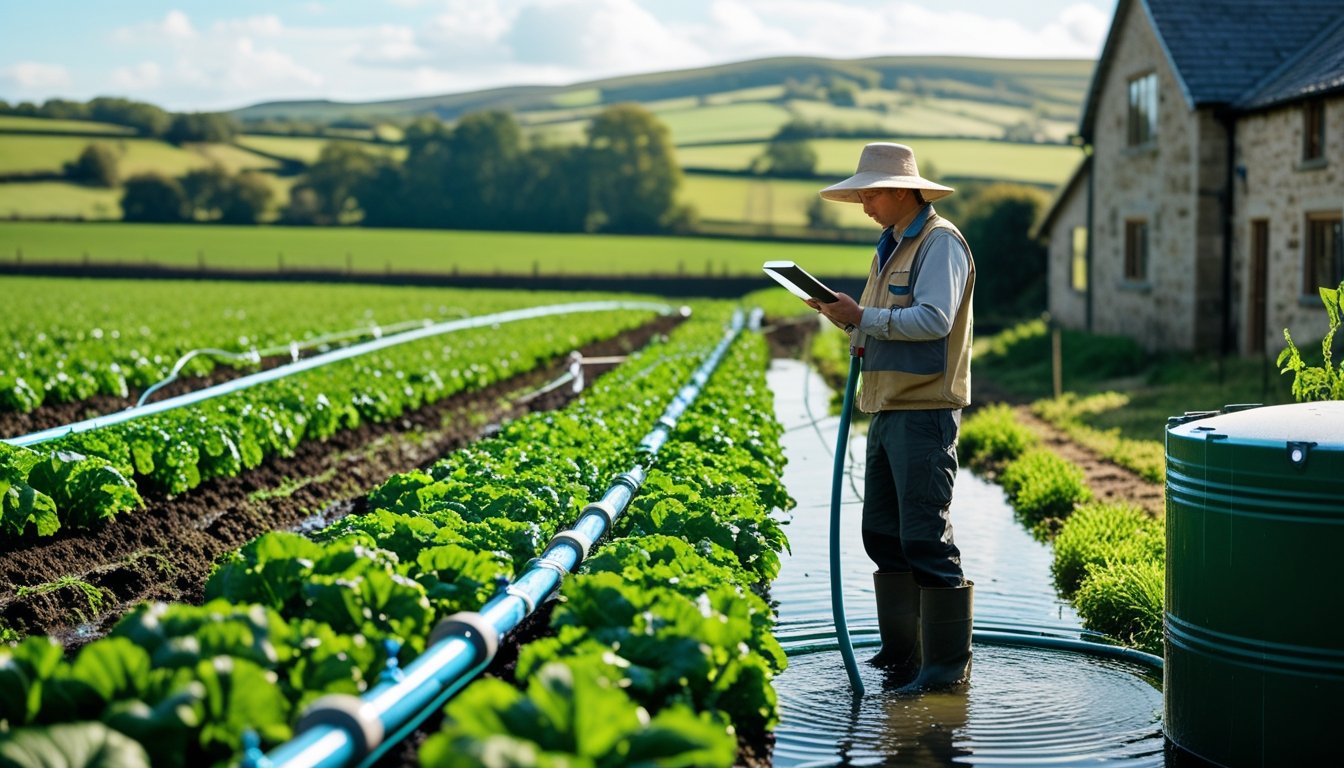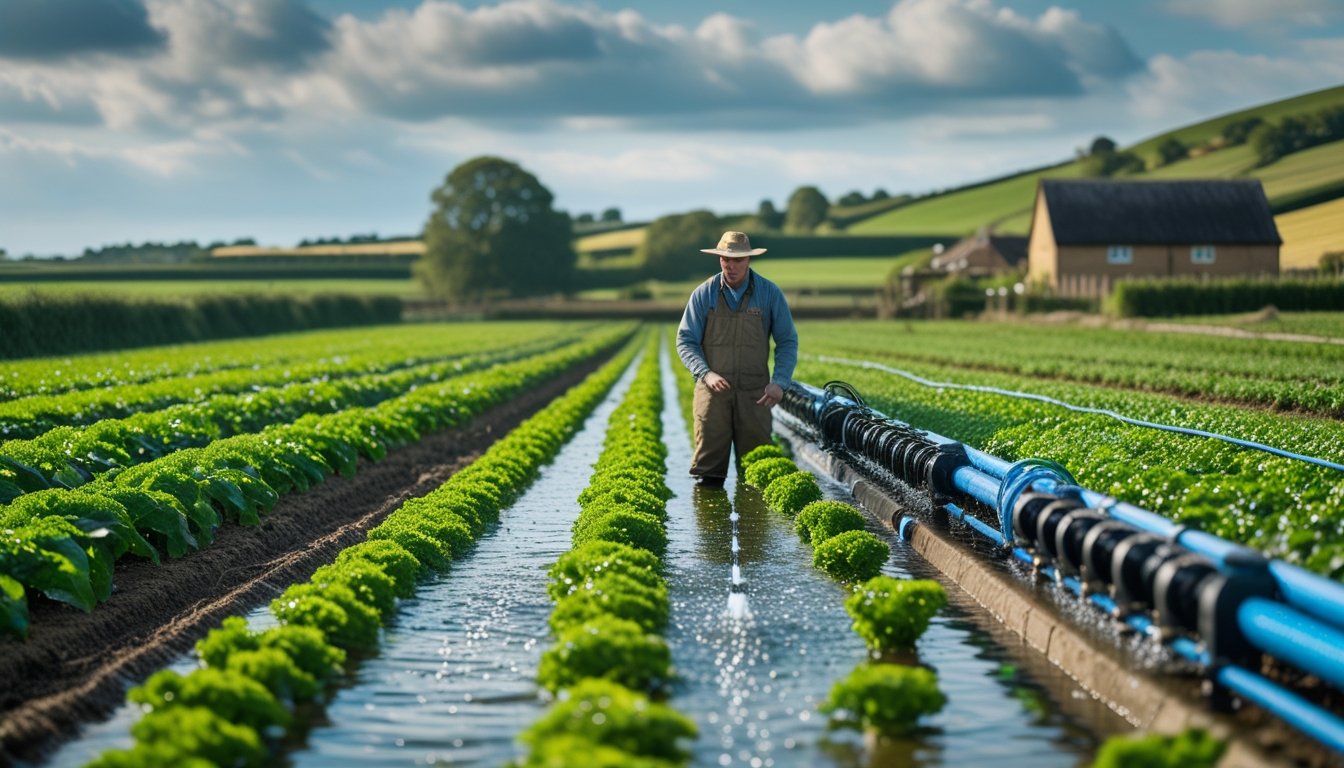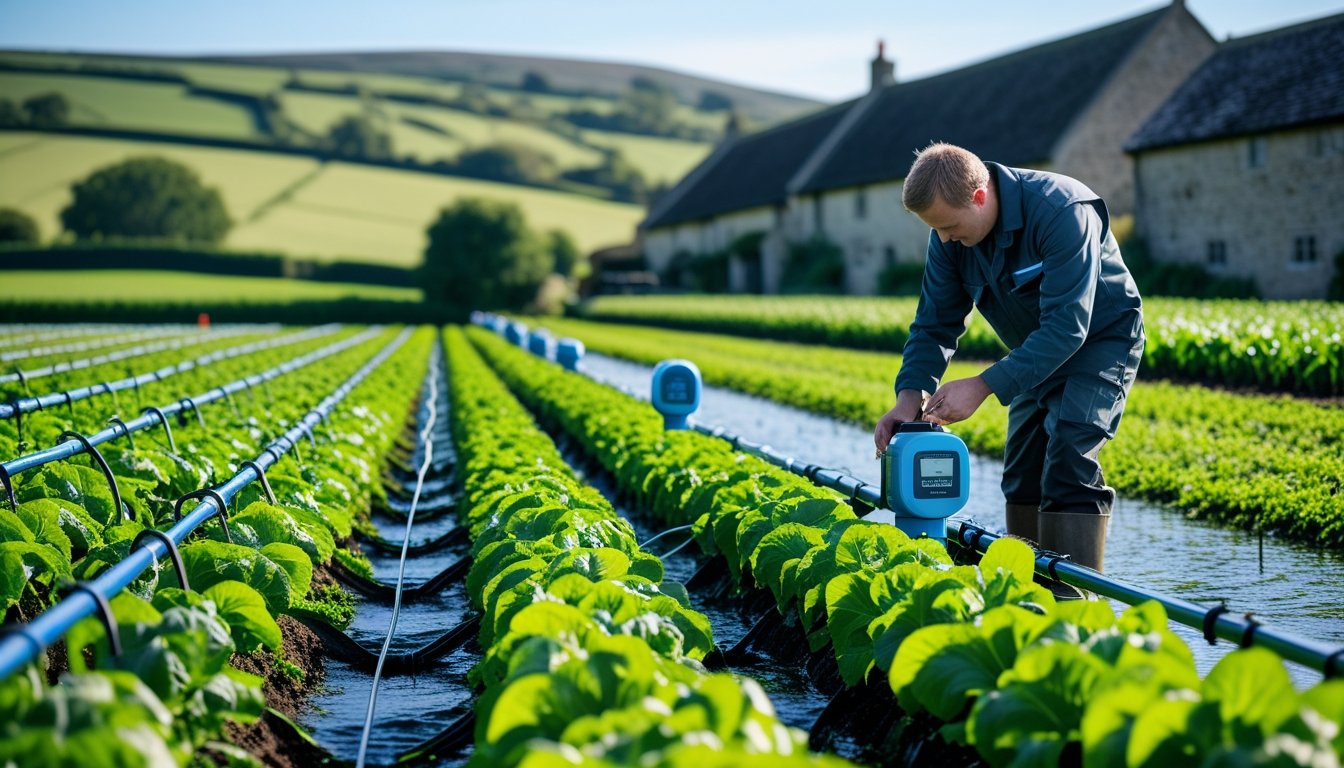Late updated: 11 Nov 2025 10:11
Written by: Oliver Bennett
Efficient Water Conservation For UK Rural Farms: Sustainable Strategies For Agriculture
Efficient water conservation is more than just a buzzword; it's a pressing necessity for rural farms in the UK. With climate change and frequent hot summers increasing water demand, farmers face the challenge of sustaining productivity while using water responsibly. Implementing efficient water conservation practices can drastically reduce water use while maintaining crop yields, thus supporting both economic and environmental sustainability.

Our focus is on showcasing practical solutions and technologies that can be employed by farmers to enhance water management on rural properties. From smart irrigation systems that optimise water distribution to soil moisture conservation techniques, there are numerous strategies available to tackle the issue of water scarcity. By integrating these innovative methods, we can significantly mitigate the risks posed by fluctuating water availability and rising demand.
Adopting effective water management practices not only safeguards resources but also boosts rural productivity. The progression towards sustainable farming is both a necessity and an opportunity for rural farms to thrive in a changing climate. This blog post will explore core principles, techniques, and answer common questions to empower farmers across the UK.
Key Takeaways
- Water conservation is essential for UK rural farm sustainability.
- Practical techniques and technologies help manage water use efficiently.
- Effective practices ensure resource protection and increased productivity.
Core Principles of Efficient Water Conservation on UK Rural Farms

Efficient water conservation is vital for UK rural farms to maintain agricultural productivity and ensure environmental sustainability. Managing water resources effectively helps protect farm livelihoods and enhances economic stability.
Understanding Water Scarcity and Agricultural Water Needs
Water scarcity is a pressing concern in UK farming, posing challenges to maintaining crop yields. To address this, understanding water needs for different crop types is crucial. Many crops rely on specific rainfall amounts or irrigation to thrive, impacting farm productivity if not managed properly.
Different crops absorb water at varied rates, influenced by factors like soil composition and local climate. Efficient water use requires adapting irrigation schedules and altering planting methods to optimise water absorption and retention.
Water Efficiency and Sustainable Water Management
Improving water use efficiency is a cornerstone of sustainable water management. By optimising water usage, we can significantly reduce waste, preserving valuable resources. One effective approach is implementing precision irrigation systems that deliver the right amount of water directly to plant roots, minimising evaporation and runoff.
Adopting sustainable practices such as recycling water and using rainwater harvesting systems contributes to water conservation. Monitoring and managing water consumption across the farm helps us better understand usage patterns and identify opportunities for improvement.
Soil Health and Moisture Retention Strategies
Healthy soil is fundamental for optimal water conservation. Practices like mulching and cover cropping enhance soil structure and increase its ability to retain moisture. This is crucial for maintaining crop productivity, especially during periods of low rainfall.
Additionally, organic matter, like compost, improves soil health, boosting its capacity to hold water. Soil moisture sensors can guide irrigation practices by providing precise data on soil water levels, allowing for more effective water management. By focusing on soil health, we enhance our ability to conserve water and support sustainable agriculture.
Practical Water-Saving Techniques and Technologies for Rural UK Farms
In the pursuit of sustainable farming, leveraging efficient irrigation methods and adopting soil management techniques are key. Our focus is on practical solutions like drip irrigation, rainwater harvesting, and optimised irrigation scheduling to ensure water resources are conserved, quality is maintained, and water security is boosted for rural UK farms.
Efficient Drip and Sprinkler Irrigation Systems
Drip and sprinkler irrigation systems are innovative methods to utilise water efficiently. Drip irrigation involves delivering water directly to the plant's root zone, minimising evaporation and surface runoff.
This method promotes healthy growth by providing targeted hydration and reducing water waste. Sprinkler systems simulate rainfall, covering larger areas uniformly. These systems, when managed properly, ensure water is used sparingly while maintaining crop health.
Retrofitting older irrigation setups with these modern solutions can improve water use efficiency significantly. Integrating automation helps in adjusting water use based on weather and soil conditions, making it a powerful tool for farms seeking sustainability and resource management.
Rainwater Harvesting and On-Farm Water Storage
Rainwater harvesting is an effective method to enhance water availability on farms. By capturing and storing rainwater, we can reduce dependency on external water supplies. Implementing collection systems such as gutters and tanks allows for efficient water capture during rainfall events.
On-farm water storage solutions enable us to maintain a reliable water supply for irrigation during dry periods. Harvested rainwater replenishes aquifers, benefits the local ecosystem, and enhances water security.
Utilising natural topography to direct rainwater into storage systems is a cost-effective way of boosting agricultural resilience. These strategies are pivotal for the conservation of water resources in rural settings.
Irrigation Scheduling and Use of Soil Moisture Sensors
Irrigation scheduling involves the strategic timing of water application to maximise efficiency and minimise waste. Utilising soil moisture sensors provides real-time data on soil hydration levels, allowing for precise irrigation planning.
These sensors help monitor moisture in the soil, informing us when and how much to irrigate. This targeted approach conserves water, optimises plant growth, and reduces operational costs. Tailoring irrigation schedules to actual needs ensures water is applied only when necessary, preventing over-irrigation and nutrient leaching.
The integration of technology into our irrigation practices represents a significant step forward in sustainable water management on farms.
Mulching, Compost, and Cover Cropping
Mulching is a simple yet effective technique where organic or inorganic materials cover the soil surface. This reduces evaporation, improves water retention, and controls weed growth. Organic mulches, such as straw or wood chips, add nutrients as they decompose, further enhancing soil health.
Composting transforms farm waste into nutrient-rich amendments, supporting soil vitality and moisture balance. Cover cropping involves planting specific crops during off-season periods to improve soil structure, enhance fertility, and prevent erosion.
By integrating these practices, farms can improve soil quality and water retention. These techniques offer a holistic approach to managing resources sustainably, enhancing both productivity and environmental health.
Frequently Asked Questions

In our examination of water conservation for rural farms in the UK, we identify practical strategies and technologies that effectively manage water resources. We explore rainwater harvesting, crop rotation, irrigation methods, soil moisture technology, available incentives, and mulching.
What are the best practices for rainwater harvesting on rural farms?
Rainwater harvesting involves collecting and storing rain from rooftops or catchment areas. For rural farms, installing gutters and tanks can efficiently capture and store water. Utilising this water for non-potable uses, such as irrigation, helps reduce dependency on mains water, especially during dry spells.
How can crop rotation improve water efficiency in agriculture?
Crop rotation can substantially enhance water efficiency on farms. By alternating crops with different water and nutrient requirements, we can prevent soil degradation and improve soil structure. This practice aids water retention, reduces erosion, and ultimately optimises water usage across growing seasons.
What methods are most effective for reducing water waste in farm irrigation systems?
To reduce water waste, implementing efficient irrigation techniques such as drip or sprinkler systems is vital. These systems deliver water directly to the plant roots, minimising evaporation and runoff. Regular maintenance and proper scheduling also ensure water is used effectively, without excess.
Can you recommend technology that assists with soil moisture monitoring?
Soil moisture sensors are invaluable for monitoring soil hydration levels. Utilising wireless sensors that provide real-time data helps us optimise irrigation, ensuring crops receive adequate water without over-irrigating. Such technology enhances precision agriculture, saving water and improving crop yields.
What incentives are available to UK farmers for adopting water-saving strategies?
In the UK, various grants and funds exist to encourage water-saving initiatives. For instance, the water-management grant offers financial support for installing efficient irrigation systems and building reservoirs. These incentives aim to assist farmers in adopting sustainable practices without significant financial burden.
How does mulching contribute to water conservation in agricultural settings?
Mulching involves covering the soil with organic or inorganic materials. This technique helps retain soil moisture by reducing evaporation. It also suppresses weed growth, further conserving water. Mulching is a simple yet effective method that conserves water and improves soil health on farms.
